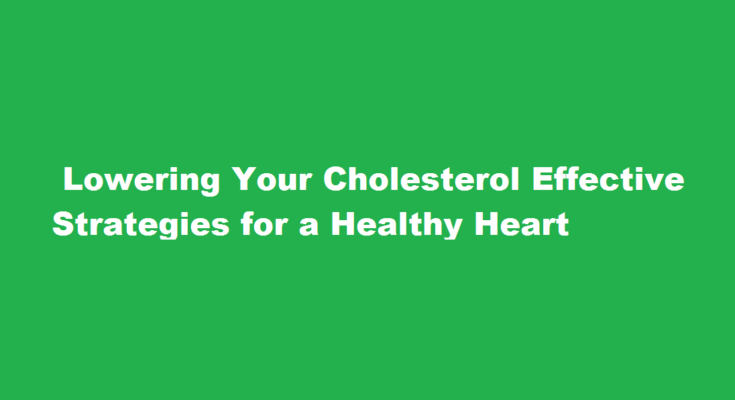Introduction
Maintaining healthy cholesterol levels is crucial for a strong heart and overall well-being. High cholesterol is a significant risk factor for heart disease, the leading cause of death worldwide. However, with the right knowledge and lifestyle adjustments, you can effectively lower your cholesterol levels and reduce your risk of cardiovascular complications. In this article, we will explore various strategies and lifestyle modifications that can help you achieve and maintain healthy cholesterol levels.
Adopt a Heart-Healthy Diet
A well-balanced diet plays a vital role in managing cholesterol levels. Incorporating heart-healthy foods into your meals can help lower LDL (bad) cholesterol while increasing HDL (good) cholesterol. Focus on consuming high-fiber foods such as fruits, vegetables, whole grains, and legumes. Incorporate lean proteins like fish, poultry, and plant-based sources. Limit saturated and trans fats found in red meat, full-fat dairy, and processed foods. Replace unhealthy fats with healthy alternatives like olive oil, avocados, and nuts. Additionally, include omega-3 fatty acids from sources like fatty fish and flaxseeds to promote heart health.
Maintain a Healthy Weight
Obesity and excess weight can contribute to high cholesterol levels. By maintaining a healthy weight, you can significantly reduce your cholesterol levels and decrease your risk of heart disease. Incorporate regular exercise into your routine, aiming for at least 150 minutes of moderate-intensity aerobic activity per week. Engage in strength training exercises to build lean muscle mass, which helps boost your metabolism. Combine physical activity with a well-balanced diet to achieve and maintain a healthy weight, contributing to improved cholesterol levels.
Regular Exercise and Physical Activity
Engaging in regular exercise and physical activity has a positive impact on cholesterol levels. Physical activity helps raise HDL cholesterol while lowering LDL cholesterol and triglycerides. Aim for at least 30 minutes of moderate-intensity aerobic exercise, such as brisk walking, cycling, or swimming, most days of the week. Consider incorporating activities that elevate your heart rate and challenge your muscles. Consistency is key, so find activities you enjoy and make them a part of your daily routine.
Quit Smoking and Limit Alcohol Intake
Smoking damages blood vessels and lowers HDL cholesterol, increasing the risk of heart disease. Quitting smoking has immediate and long-term benefits for your cardiovascular health. Similarly, excessive alcohol consumption can raise triglyceride levels and contribute to high blood pressure. Limit your alcohol intake to moderate levels, which means no more than one drink per day for women and two drinks per day for men. Quitting smoking and reducing alcohol consumption can greatly improve your cholesterol profile and overall heart health.
Manage Stress Levels
Chronic stress can negatively affect cholesterol levels and heart health. Find healthy ways to manage stress, such as practicing relaxation techniques, meditation, or engaging in activities you enjoy. Regular exercise also helps alleviate stress and boosts your mood. Incorporate stress-management techniques into your daily routine to support healthy cholesterol levels and promote overall well-being.
Frequently Asked Questions
What reduces cholesterol quickly naturally?
Oatmeal has soluble fiber, which reduces your low-density lipoprotein (LDL) cholesterol, the “bad” cholesterol. Soluble fiber is also found in such foods as kidney beans, Brussels sprouts, apples and pears.
Does garlic lower cholesterol?
An intake of half to one clove of garlic per day lowers cholesterol levels approximately 10%. [23,24] Mechanisms that explain the observed effects of garlic include a decrease in cholesterol absorption, cholesterol, and fatty acid synthesis.
Conclusion
Lowering cholesterol levels is essential for maintaining a healthy heart and reducing the risk of heart disease. By implementing the strategies mentioned above, including adopting a heart-healthy diet, maintaining a healthy weight, engaging in regular exercise, quitting smoking, limiting alcohol intake, and managing stress levels, you can effectively lower your cholesterol levels. Remember, it’s never too late to make positive changes, and these lifestyle modifications will benefit your overall health and well-being in the long run. Prioritize your heart health and take proactive steps towards a healthier lifestyle today.
Read Also : Strengthening Your Lungs Vital Strategies for Optimal Respiratory Health



